In Memory of the legendary General Giap (1911-2013)
General Vo Nguyen Giap of Vietnam
‘IS NO MORE’
By Professor Lee Keun-yeop
Lee Keun-yeop, Hanoi, Vietnam, Oct. 4, 2013?“General Giap IS NO MORE.” When Lenin died on January 21, 1924, Nguyen Ai Quock (Ho Chi Minh's alias in exile) sent a short telegramme reading "Comrade Lenin IS NO MORE!" to the Annamese communist comrades in Vietnam. When President Ho Chi Minh passed away on Sept. 2, 1969, the Central Committee of the Communist Party of Vietnam issued a communique beginning with, "Comrade President Ho Chi Minh IS NO MORE!" The General passed away today Oct. 4, 2013. Pathetique!
Hanoi's Ba Dinh Square is the same as it was on Sept. 2, 1945 when President Ho Chi Minh delivered to the nation the "Declaration of Independence" before half a million Hanoians here. Prior to this, the history professor-turned guerrilla leader Vo Nguyen Giap's unit arrived here from Tan Trao Base on Aug. 30.
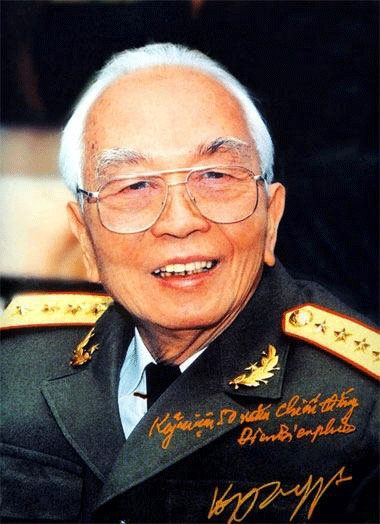
A slight difference is that at the western rim of the square stands the massive Ho Chi Minh Mausoleum. The same trust and respect can be seen on the face of every pilgrim from all over the land and overseas, waiting for their turns to pay tribute to the man they have cherished in their hearts intimately as Bac (Uncle) Ho in a queue of several hundred meters.
Under a shady grove at the southern rim nestles a modest two-story house facing a 'red flag with a golden star' hoisted on top of the nearby Army Museum tower. This is the residence of Gen. Vo Nguyen Giap, Vietnam's legendary “Lord of the Battle Field.’
Here he used to stroll, meet with visitors and, most of all, write a lot. His major works are "Dien Bien Phu" and "Road to Dien Bien Phu." The former represents his strategies, the latter his autobiographical depictions in which readers may peep into his humanitarian views on the war.
The May 8, 1954 front page headline in The Korea Times (Ewha Womans University archive) in blunt letters reads: "DIEN BIEN PHU FALLS." The wire service story says, "Dien Bien Phu fell today (May 7) in the Asian debacle that sealed with blood one of the most glorious and disastrous chapters in the annals of French armies... Fate of de Castries, the garrison commander, and the defenders is not immediately ascertained..."
Prior to it, TIME magazine (May 3, 1954) reported, "To Colonel De Castries in his commanding bunker came an unexpected message from President Eisenhauer. 'In common with millions of my countrymen, I salute the gallantry and stamina of the commander and soldiers who are defending Dien Bien Phu.'"
"The next day Sir Winston Churchill, the British prime minister, paid tribute to the 'heroic resistance' of defenders of the Dien Bien Phu."
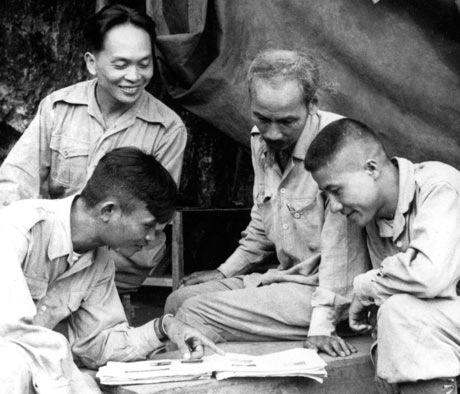
The Dien Bien Phu campaign (March 13-May 7, 1954) was a battle between the French colonial army led by Colonel Christian De Castries and the Viet Minh regular army led by Gen. Giap in the densely fortified valley in the northwestern highland of Vietnam. Colonel De Castries represented "gallantry," General Giap (Mars de Armour) was called by a French journalist "a snow-covered volcano."
On the evening of May 7, 1954 after 55 days of bloody fighting, Giap's spokesman through Peking Radio announced the fall of Dien Bien Phu. This marked the end of 96 years of French colonial rule of Vietnam.
Yet President Ho Chi Minh in 1954 said that this victory was just the beginning (hinting impending war against the United States). Considering Eisenhaur and Churchill's concerns over Dien Bien Phu, we can easily understand the views that the Vietnam War was a continuation of the 1950-53 Korean War.
Young Vo Nguyn Giap left home in An Xia commune and was admitted to the Lycee Quoc Hoc in the royal city of Hue in central Vietnam. This school was founded by Ngo Dinh Ka who was a high ranking official at the King Bao Dai's court. He is father of Ngo Dien Diem, former president of the Saigon regime. He intended to teach Vietnamese traditional values in addition to the then widely taught French culture.
At the school we find the following names: Nguyen Tat Thanh (Ho Chi Minh's name when young), Ngo Dinh Diem, Pham Van Dong (wartime prime minister), Vo Nguyen Giap. Except for the ill-fated Ngo Dinh Diem three men were called by TIME magazine "The Iron Triangle of the Vietnam War."
In 1926, at school, Giap joined the Revolutionary Party for New Vietnam. He led students' anti-French strike, for which he first experienced the taste of six months’ detention.
After graduation from the Department of Politics and Law of the Indo-China University in Hanoi with a bachelor's degree, he became a professor at Thang Long College in Hanoi and went on to teach history. One of his students who became the president of the Red Cross Society under former Saigon government recalled, "Professor Giap's lectures were full of inspirations and revelations. For example, when he dealt with Napoleon's Leipzig and Waterloo battles he drew with chalks the movements of both sides' battlelines." This may be the reason why Ho Chi Minh picked up Giap as the army chief although there were several graduates from Whang Pu and Yun Nan Military Schools in southern China.
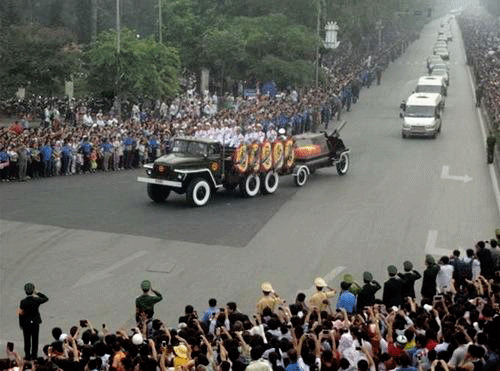
In 1940 after a pathetic parting with his newlywed wife at Hanoi's West Lakeside, he crossed the Sino-Vietnamese border with Pham Van Dong, reaching Kunming. There they welcame Ho Chii Minh who was returning from the Soviet Union. Shortly his wife was arrested by the French authorities and died in the Vinh Prison two years later.
On Dec. 22, 1944, Giap organized the first Viet Minh military unit. This is the Founding Day of the Vietnamese Army. His troops grew up to be one of the most fearsome armies of the world through countless ordeals.
In the spring of 1945, the 400-man Giap's unit mounted a surprise attack on the Japanese garrison post, claiming 13 lives of Japanese soldiers. I think this offensive was motivated by Giap's wrath over the fact that at this time Japan exploited the Annamese (then Vietnamese) rice and caused one million Vietnamese deaths by starvation. ‘One Million Vietnamese Starvation’ (1992) is the co-work by Dr. Van Tao, director of the National Institute for History Research, Vietnam and Professor Furuta Motoo at Tokyo University. At that war time I also tasted rationed Annamese rice. It was not sticky!
During a Sino-Vietnamese border campaign in 1947, Giap's units delivered several powerful blows to the 12,000-man French corps and drove them to surrender. During the campaign Giap's father, a village scholar teacher, was arrested and gillotined. No one has ever seen his tears through 30 years of war: through Dien Bien Phu (1954), Quang Tri, Tua Tuen, Hue campaign (1972) which decided the fate of the Vietnam War, and Saigon fall. Professor Dang Bic Ha, wife of Gen. Giap, loved and encouraged the general during those difficult times as a staff member at the headquarters.
Bernard Fall writes: "...the sentimental history professor in 1930s, the self-taught guerrilla leader of the early 1940s, and the brilliant strategist of the 1950s; the West may find it difficult to produce worthy match for him in the foreseeable future." (‘Vo Nguyen Giap’, 1962). Fall fell while covering in Saigon during the "Tet (Lunar New Year) offensive" in 1968.
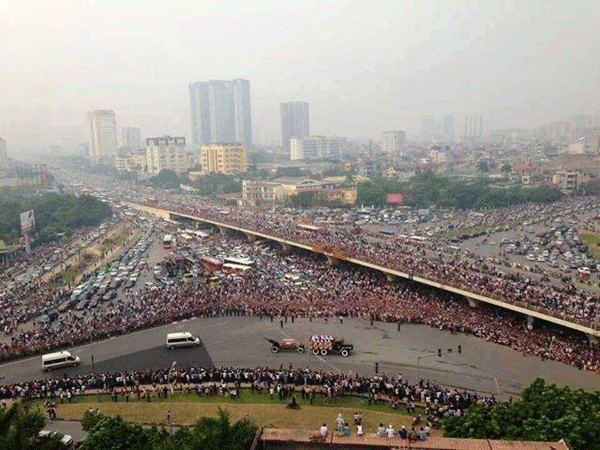
In the fall of 1996 I had a very rare privilege to visit General Giap at his residence, Hanoi. The General said to me, "Through socialism, President Ho Chi Minh tried to make people happy, not only the Vietnamese people but also the peoples of the whole world." I echoed, "President Park Chung-hee also delivered the South Korean people from poverty through a kind of socialistic planned economic policies."
I feel very much rewarded that my somewhat "lonesome" comparative study of Gen. Helmut Bernhardt von Moltke and Gen. Giap was given relevance by Mark Henderson's work, "Top 100 Greatest Military Leaders" (TIMES of London, News International, 1997) in which Moltke and Giap rank 39th and 40th respectively. I think, apart from ranking, the combination of both men is fantastic.
Moltke wrote historical fictions, while Giap was a history professor-turned general. Moltke was the builder of the Prussian army that brought about German unification. Giap is the builder of the Viet Minh army which fought for Vietnamese unification. Moltke's Prussian army defeated Denmark, Austria, and France, while Giap delivered a strong blow to the Japanese garrison, defeated France and the mighty United States.
In 1979 Vietnamese army inflicted a humiliating defeat to the PLA (People’s Liberation Army) of China which had mounted a 'punitive' invasion into Vietnam. By this incident, Vietnam gave 'a good lesson' to China. Though Moltke fought in the imperialistic power conflict, I think, Moltke is to Bismark what Giap is to Ho Chi Minh. As defense minister Giap fought the longest war in the 20th century for his fatherland. Giap will remain in military annals as does Moltke as a classic.
Once again Hanoi's Ba Dinh Square. The green foliage of the happy grove reflects the celestial light. Here he enjoyed a good health until he was taken to the Army Hospital for the professional care in 2009. The General at his advanced age of 102 breathed his last on Oct. 4, 2013.
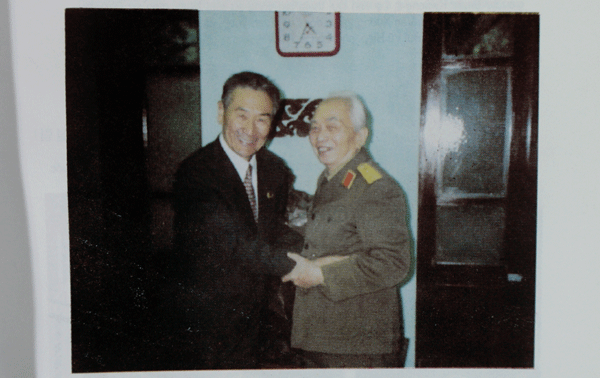
Then his coffin was carried by a helicopter to his home An Xa Commune in the central Vietnam. He was buried on a seaside hill overlooking the South China Sea.
We see three 30-year wars in Asia: Two in the 12th century and one in the 20th.
Goryeo (Medieval Korea) Kingdom's 30 years’ anti-Mongol Yuan resistance war came to a tragic end when the Sam Beyol Cho (the royal city defending garrison) warriors were annihilated by the Goryeo-Yuan coalition army in the fall of 1274 on Korea's southernmost Jeju Island. Gen. Kim Dong-jeong took his own life.
Vietnam's 30 years anti-Mongol Yuan war ended with the Vietnamese victories in 1289: two victories on land and another over the naval invasion. The hero was General Tran Hung Dao.
Vietnam's 30 years anti-imperialistic war against the Western powers in 20th century ended with the Saigon fall on April 30, 1975. Hero was Gen. Giap. On that day hundreds of students at Berkley Campus, the Mecca of the students activists, marched down the streets, chanting, "Fall of Saigon, Rise of Indochina!" (TIME)
Today in the otherwise peaceful South China Sea, or the ASEAN Sea, tides are rough. Naval vessels of a remnant of imperialistic powers haunt this waters. The northern superpower claims sovereignty over this waters. Gen. Vo Nguyen Giap (meaning Mars de Armour) will defend this land and sea. Mun Nam Dai Tuong Vo Nguyen Giapj(Long Live, General Giap)!
I owe much of revelation in my Vietnam studies to the generosity of Mr. Nguyen Phu Binh, former Vietnamese ambassador to South Korea and to Japan, now the Deputy Director of the daily Economic Times of Vietnam. His generosity led me to have a rare privilege to visit Gen. Giap at his residence.
Editor’s note: Dr. Lee Keun-yeop taught Education Philosophy at Yonsei University in Seoul. Currently, he is director of Korea Center for Social Sciences and Humanities on Vietnam, also a East Europ and Balkan analyst. He can be reached by phone: +010-7335-8985 or +2-815-8985.

